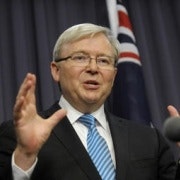Fraser's plea to the Labor core
It was just on 36½ years ago that Australia was in the midst of a gathering, violent and unprecedented storm involving the prime minister, opposition leader and governor-general.
It changed the nature of political discourse. It was heated, pointed and hard. It even changed the country. All these long years later many have neither forgiven nor forgotten.
And so, last night, hosted by the University of Western Sydney, former Liberal prime minister – and former Liberal – Malcolm Fraser stood before a packed auditorium in Parramatta to give a speech about modern Australia.
It was the Whitlam Oration.
Who would have thought it? Who would have imagined that Malcolm Fraser would, could or should have paid thoughtful and detailed tribute to his great political foe?
Gough Whitlam was delighted. "That's bloody good," he said on being told the news.
Fraser did not disappoint the ALP faithful, at least, with his oratory – coming just a week after his 82nd birthday.
He spoke at length of the Whitlam government ending the final legal remnants of the White Australia policy and of Whitlam's work on land rights for Aboriginal Australians. He reminded his audience that Whitlam was the first Australian PM to recognise China, and reminisced about the time they both stood on the back of a truck overlooking Melbourne's Fitzroy Gardens arguing for the independence of The Age newspaper and Fairfax against attacks from foreign interests. He spoke of common values that were above daily politics.
Of course, Fraser's oration did not hold back when it came to issues of national identity.
Let me quote a section:
"At the end of the Vietnam War, tens upon tens of thousands of Indo-Chinese sought to flee to safety. Initially, the Whitlam government decision was to have limited numbers of people from Vietnam. My government made the decision to take large numbers.
"Gough Whitlam did not play politics with this. It would have been easy to do. Instead he led his party to fully accept the convention of the post-war years. Bipartisanship on issues of immigration was maintained. This bipartisanship was fundamentally important.
"It shows that political conflict can live alongside the sustaining of a shared, deep respect for people regardless of colour, race or religion – a belief that people should be respected for who they are.
"The capacity to engage in conflict and maintain such a respect depends on a degree of consensus between political leaders. Gough Whitlam and I participated in this consensus.
"If, instead of this consensus, the disgraceful race to the bottom of populist political point scoring of recent years had prevailed, the cost to Australia would have been enormous.
"Australia would have lost tens of thousands of hard working productive citizens – citizens who have manifested an extraordinarily strong loyalty to this country. Citizens who have directly sought to repay what they regard as the generosity of their reception in Australia.
"Some have entered the armed forces, others have entered public life. We would have lost all of this and we would have re-established our reputation as a racially exclusive society."
He spoke at length about Australia's relationship with the US.
"In dealing with countries in our own region, we need to show a greater element of independence and a greater strength of mind.
"We need to increase our sophistication in our approach to relationships throughout east and south east Asia. Our government still tends to say that strategic considerations have no impact on our good economic and trade relations with China.
"That is plainly not true. We cannot expect our trade relationship to be unaffected if, on every occasion, we follow America in strategic matters.
"Independence of mind and recognition of Australia's national interests will be more important in the light of developments in the relationship between China and the United States. If the US wishes to maintain a position of primacy over all others, that will not be acceptable to China. No less, if China, because of its increasing economic influence and growing military strength, seeks to replace the United States, that will not be acceptable to the United States.”
Overall, the speech was a plea from Fraser – aimed as much as anything at the core of his former party – to lift their sights and their heads.
We all know it's unlikely they will take heed. In fact, it's certain they won't, for their course is set. For example, it only takes one or two minutes listening at any time to the next immigration minister, Scott Morrison, to know exactly where many of their minds are. And that involves the words "fear”, "phobia”, "boats” and populist polls.
It was a 45-minute oration of reflection and thought, and worthy of the two former politicians – both elected as our prime minister in times just as politically fraught as today – who sought, above all, to work to build a decent and independent nation.
Indeed, for the "men and women” of Australia.
Alister Drysdale is a Business Spectator commentator and a former senior advisor to Malcolm Fraser and Jeff Kennett.













